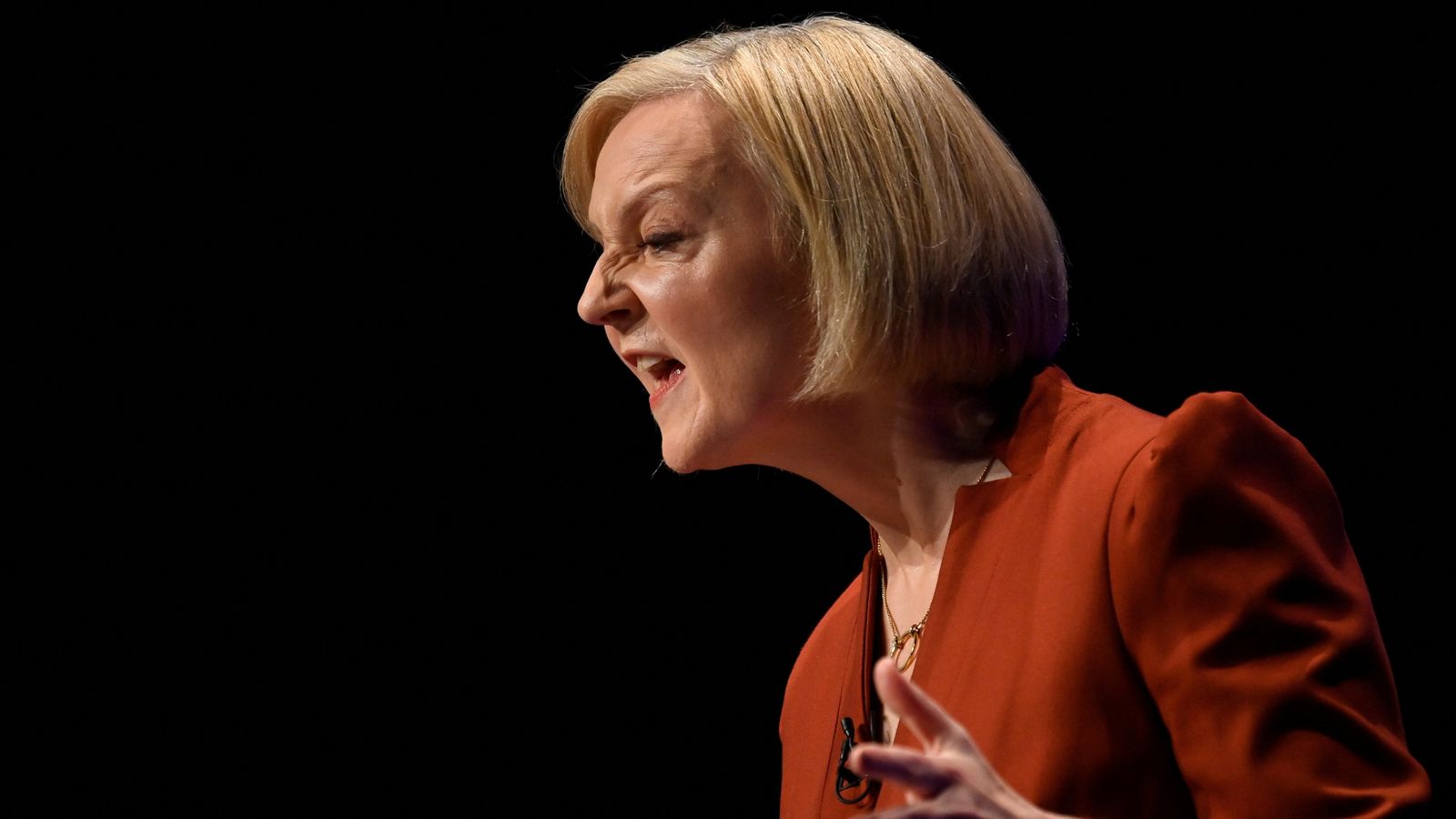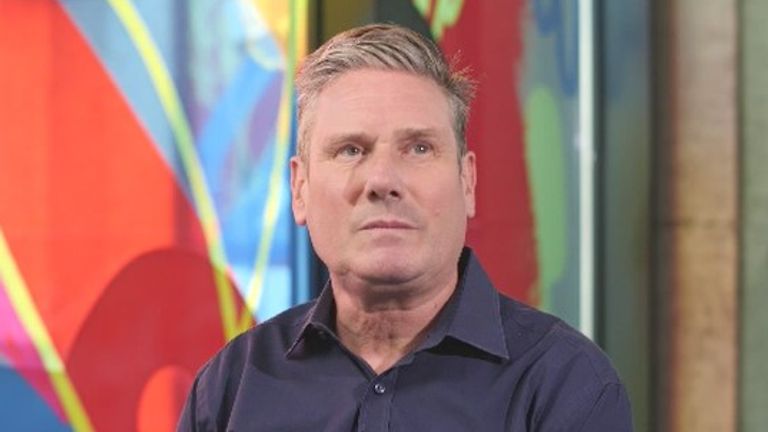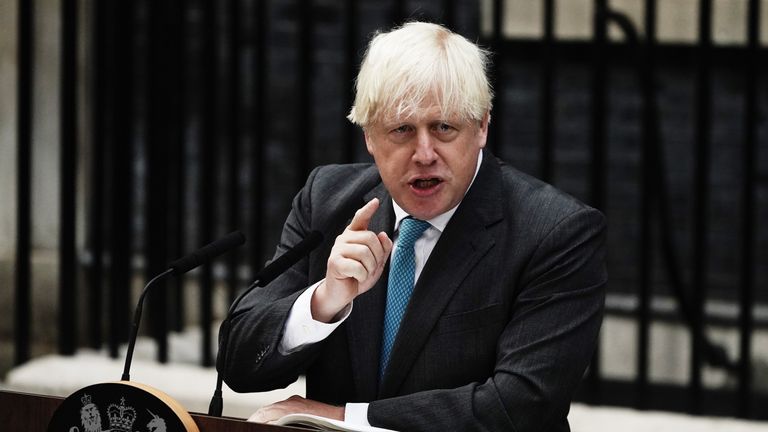On Thursday, the day after the end of the conference season, YouGov hosted a focus group with seven Blue Wall voters from around the South East exclusively for Sky News.
Some natural Conservatives, some former Tony Blair supporters, all with one thing in common: each voted Tory in the 2019 general election. Now their votes are up for grabs.
Here’s what our floating voter focus group found:
None said they were certain to vote Tory at the next election
Of the seven strong group, all of whom voted for Boris Johnson, none were prepared to say they would definitely vote Tory next time. Just one participant of the focus group confirmed they were more likely than not to back Liz Truss’s party next time around – suggesting plenty of doubts are harboured by the rest.
Several in the group were not wildly enthusiastic about the alternative – a Labour government – but felt it was now the default for the country given a profound concern at the existing team in power.
Stephanie, a solicitor, declared: “Do I think she (Truss) can do it? No. I don’t think she has the skills, the experience or the team behind her, and they’re all fighting against themselves.”
The group didn’t appear to think a month ago they would dislike Liz Truss – with Phyllis, an admirer of Margaret Thatcher, saying she started out believing the new PM would be better than Boris Johnson. But the decisions Truss has made in her first four weeks in power have left a profound impact on these voters.
Voters worry the Truss plans are dangerous
The focus group demonstrated just how closely voters had been paying attention to the succession of announcements by the new government, and have taken fright at the change of direction by Truss.
“In order for her plans to take place, it requires an enormous amount of borrowing and that’s putting up interest rates,” said Jane, a hospital inspector. “So, we’re potentially bankrupting the country. What Liz Truss is proposing is very reckless. I don’t think this is the time we should be experimental.”
Phyllis, a cashier, said that Truss was “going in too hard” with her plans without being in touch. Others worried what it would mean in practice.
David, who is retired, said that “you can’t just say growth, growth, growth. What’s the plan behind that?” Only one member of the group, Patrick, was positive and suggested he admired her bravery.
Voters do not warm to Truss’s personality
Just one of the seven members of our focus group at the end of the session voted to say they trust Liz Truss. Even that one backer, Patrick, volunteered that he felt she had less energy, was more like a “schoolteacher” and the “delivery wasn’t there” but liked the core Conservative messages she espouses.
The group did not see her as a unifying figure. Paul, a former local government officer, said she was “very abrasive” in her conference speech. He highlighted her childhood going on CND marches, saying she’s “taking it out” now on the Greenpeace protesters who interrupted the speech.
Jane, a mother of twins, suggested her attack on the “anti-growth coalition” was actually divisive. “I find her a very uncomfortable (watch),” while Jasmine who worked in the financial services industry suggested Truss is at her most passionate when she is attacking others.
These southern swing voters are edging cautiously towards Labour
Three of the seven said they were likely to vote Labour at the next election. Two further members of the group had not made up their mind. For a party which has in recent times struggled to get disaffected Tory voters to consider Labour, this is a good result.
Keir Starmer was described as the “lesser of two evils” by one member of the focus group, most of whom felt the Labour leader currently has the political edge.
David, who worked as an auditor, said that it is now “inevitable” there will be a Labour government – a sense of inevitability is often politically advantageous for a political party. There was not unalloyed enthusiasm, however.
Keir Starmer remains damaged by the Corbyn years and fears of a lurch to the left
These southern Blue Wall voters were still worried by what they saw as the stain of the Corbyn years. Jane said she voted for Boris Johnson in 2019 because of Jeremy Corbyn and antisemitism.
Patrick, who works in the rail industry, highlighted how many of the shadow cabinet served under Jeremy Corbyn.
David said that while Keir Starmer knows he needs to have centrist policies to be electable, “I’m very worried that because of the makeup of the Labour Parliamentary Party, he’ll be under huge pressure to move to the left in government”.
There were concerns for many in the group that a Labour government could mean more strikes: just one, Paul, who worked in local government, said that inflation could mean in some cases they were justified.
Many in Westminster may see Starmer as having cut ties with much of the Corbyn era – the public are not so clear about the difference.
Voters aren’t yet convinced Keir Starmer is strong enough
The Labour leader was seen as honest, decent and a good salesman by most members of the group. But there remains a lingering concern over whether he is tough enough to take on his party if they demand he lurch to the left in power.
Some in the group queried his lack of policy specifics. David said the party is “just very polarised: you’ve got the extreme left and then you’ve got the middle and then Keir Starmer who will say anything.”
Jane said that his difficulty “is a divided party and he struggles to convey his personal convictions.”
Stephanie also felt Starmer is more centrist than a leftwinger “but Labour is funded by the unions so he may have to support them”. Voters were “between a rock and a hard place,” she added.
Voters remain incandescent with Boris Johnson. There’s no hope of a comeback
Thatcher fan Stephanie said she was embarrassed and ashamed by the Conservative party.
David said that having voted Conservative, the more he saw of Boris Johnson the more he was impressed by his intellectual ability … but as time wore on “I just lost complete trust in him; he has no moral compass”.
There was still disgust at partygate, with Jane remaining incandescent at what happened in the Johnson era.
Voters want a general election more than another Tory leadership contest
Patrick, the most ardent Conservative supporter of the group, said that if the Conservatives do not rally round Liz Truss, “they’re committing political suicide”.
Jane, however, said that we were already past the point of no return: “I don’t think she’ll survive. I think she’ll gradually give up on things because she’ll watch her popularity ebb away, then she’ll not be able to manage her MPs and we will have a general election sooner rather than later.
Three of the group said that Tories should get rid of Liz Truss. Four of the seven wanted an early election.
Click to subscribe to Beth Rigby Interviews… wherever you get your podcasts
Core one nation Conservative values still looked popular
The danger for Labour and Starmer is that there is a lingering fear of the left, and a residual affection for core Tory values. Patrick said the Tories should go back to standing for law and order, high growth, low taxes, and supporting aspirations.
Self-styled centrist Jane said that as well as strong public services, she believed in a healthy economy to provide the tax revenues to support them.
Jasmine, who could now support Labour, said the “Tories have still got the interests of the country at heart in essence”.
The focus group participants are profoundly worried about the future
Every member of the group said they were “negative” about Britain’s future.
Stephanie said she had no faith in those in charge to solve the nation’s problems. Jane said she was feeling “quite highly anxious” for her children, adding that there was an “arrogant disconnect” between leaders and voters but what was different this time was the “borderline desperation” epitomised by the use of food banks.
Phyllis felt it was less bad in the 1980s than today because in the Thatcher era there was greater social mobility then.
David said that the difference between the 1970s and now is house prices. Jane concluded by saying she thought “we’re on the edge of some social unrest”, adding she “doesn’t want to see strikes and wants everyone to negotiate but some people are going to be so desperate.”
It is hard to remain in power if that sentiment is widely felt.


